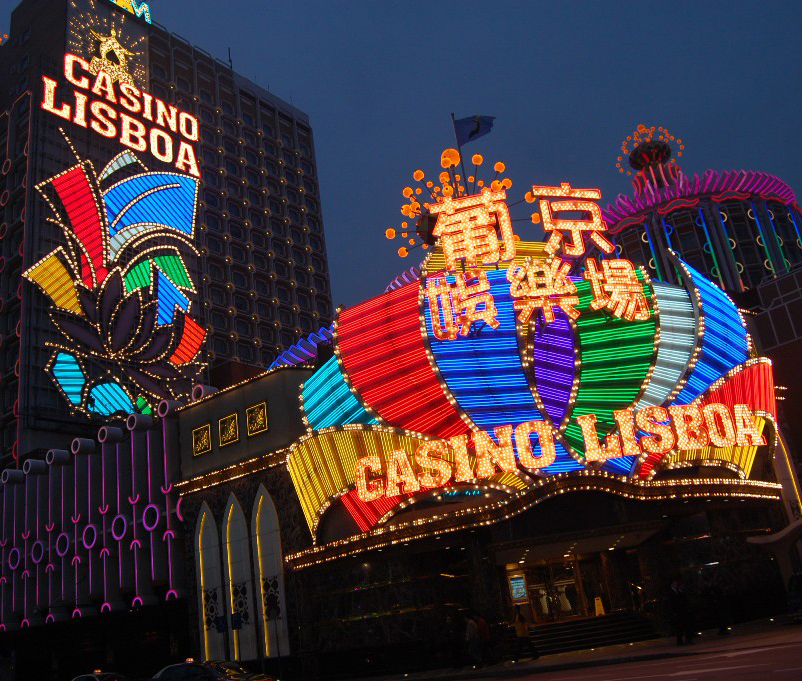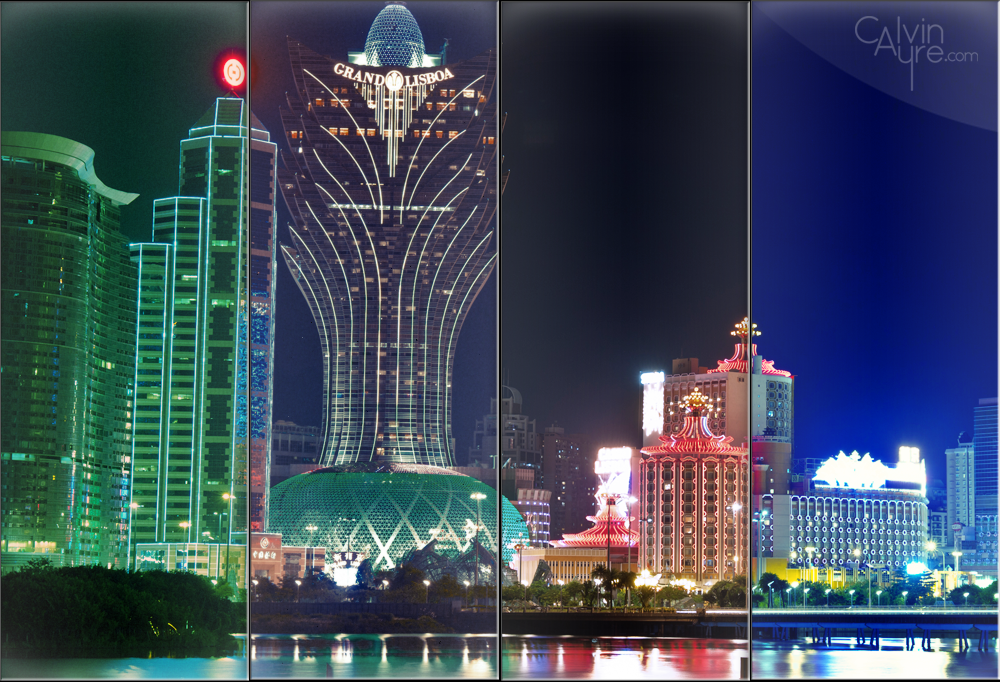For investors looking for a piece of the action on the island of Macau – the world’s largest gambling market – 2012 has been awfully confusing. The year got off to a roaring start; revenues on the island rose 27% year-over-year after 42% growth in 2011. Shares of the island’s six publicly traded operators boomed, with four different companies seeing their share price rise over 30%. Analysts were happy, shareholders were ecstatic, and executives on the island thought the growth would continue for the long term.
 Then May rolled around. Fears of a hard landing in China surfaced seemingly out of nowhere; growth estimates on the island were cut by a number of analysts; and Macau stocks tanked, falling 18 to 30 percent in just five weeks. It seemed that the growth story in Macau was finally over, and that going forward, casino operators in the enclave would face the same highly competitive, even cannibalistic challenges as many of their Western counterparts.
Then May rolled around. Fears of a hard landing in China surfaced seemingly out of nowhere; growth estimates on the island were cut by a number of analysts; and Macau stocks tanked, falling 18 to 30 percent in just five weeks. It seemed that the growth story in Macau was finally over, and that going forward, casino operators in the enclave would face the same highly competitive, even cannibalistic challenges as many of their Western counterparts.
After the sharp fall in Macau stocks, many analysts – myself included – noted that maybe things weren’t actually that bad. Slowing VIP growth could be offset by a rise in mass market customers, who by some estimates are four times as profitable as their high-rolling brethren. And even a slowly expanding Chinese economy would create more millionaires, and a larger middle class, than any civilization in the history of mankind. Wall Street began to agree; Nomura Securities analyst Harry Curtis predicted 40 percent upside for US-based operators Las Vegas Sands (LVS), Wynn Resorts (WYNN), and MGM Resorts International. Goldman Sachs analysts would use similar reasoning to recommend WYNN and Galaxy Entertainment (GXYEY.PK) a few weeks later. By August, the stocks had bottomed, and they have spent the last three months handily beating the broad market. The market seems to have accepted a new, more efficient, if less flashy Macau, where revenue growth has dimmed – October winnings rose just 3.2% year-over-year, though they did set an all-time record – but a move toward higher-margin mass market players and a focus on expense control can keep earnings climbing for the next few years.
The roller coaster 2012 for these stocks is not necessarily surprising. Gambling stocks are typically more volatile than most, while Wall Street has a tendency to act like an insecure girlfriend: wildly optimistic one moment, suicidally despondent the next. But the question now is: where is Macau going? And should investors come along for the ride?
From the numbers, there appears to be a real need for skepticism. Overall, revenue growth has slowed markedly, as noted above; in the third quarter, VIP revenue in Macau actually fell year-over-year. Total casino winnings on the island rose only about seven percent for the quarter, a far cry from the 27% increase in the first three months of the year. Most notably, the earnings reports released by Macau operators over the past two weeks don’t show the type of explosive growth many investors have to come to expect. Galaxy posted 46 percent growth in EBITDA (earnings before interest, taxes, depreciation and amortization), garnering headlines, but the report wasn’t quite as rosy as it appeared at first blush. Much of the growth came from the company’s new Galaxy Macau property on the Cotai Strip, which had only been in operation for five months a year ago. According to the company’s earnings presentation, total revenues grew just six percent, as winnings at the legacy StarWorld property fell 19 percent, in part due to lower hold but mostly due to a 14% drop in VIP table drop. Sands China saw similarly impressive figures, with net revenue up nearly 37% and net income up 17%, but those numbers, too, were inflated by the effect of a new Cotai property and, in Sands’ case, a sharply higher VIP win rate. VIP volume for Sands China also dropped by double figures, some eleven percent.
![]() The loss of VIP business wasn’t limited to those companies; Wynn Resorts saw a 12% drop in VIP turnover, with Wynn Macau winnings and profits falling modestly. The Macau performance was so weak that it was actually overshadowed by strength at Wynn’s Las Vegas properties, a feat that proved that “up is down, black is white, and Kim Kardashian isn’t a soulless whore,” as our own Peter Amsel poetically noted. MGM saw VIP turnover drop just 5 percent, but earnings growth and profit margins in Macau disappointed. Already the laggard in market share on the island, MGM is hoping a new Cotai casino will capture more customers.
The loss of VIP business wasn’t limited to those companies; Wynn Resorts saw a 12% drop in VIP turnover, with Wynn Macau winnings and profits falling modestly. The Macau performance was so weak that it was actually overshadowed by strength at Wynn’s Las Vegas properties, a feat that proved that “up is down, black is white, and Kim Kardashian isn’t a soulless whore,” as our own Peter Amsel poetically noted. MGM saw VIP turnover drop just 5 percent, but earnings growth and profit margins in Macau disappointed. Already the laggard in market share on the island, MGM is hoping a new Cotai casino will capture more customers.
The weak reports haven’t yet had a major effect on share prices, with the market perhaps awaiting Melco Crown Entertainment (MPEL) and SJM Holdings (SJMHF.PK), who report this week to round out the economic picture on the island. But there seems likely to be some short-term headwinds for Macau stocks. The three-month rise in the stocks likely priced in stronger earnings than were released. Certainly, there were one-time factors that caused some of the misses, such as Las Vegas Sands’ dramatic drop in hold at its VIP tables in Singapore and a similarly poor win rate at MGM’s Bellagio. But given Wall Street’s fickle sentiments toward Macau, another pullback seems likely to come sooner rather than later. The catalyst could some as soon as next week, as Melco Crown stock has run up sharply as of late, gaining over 40 percent in the last three months. Should MPEL miss earnings estimates next week, the effect will reverberate across the sector, and likely begin another downswing for Macau-facing stocks.
If – or more likely, when – those share prices drop, long-term investors should once again take a serious look at stocks on the island. The bull case remains much the same as I made in mid-June; even slower growth in Macau dwarfs the growth found anywhere else in the world, and the same goes for economic growth across China as a whole. The difference between 5 percent and 7 percent growth in the Chinese economy matters to investors, as does the difference between 15 percent and 11 percent increases in revenues to the operators. But it’s not the difference between profits and losses, at least not for the experienced casino operators who are almost literally printing cash in Macau. In an uncertain economic world, there are few business models better than operating a casino that caters to high-rolling Asian gamblers. As Crown’s James Packer pointed out last month, “Fuck, this must be a good business!”
Packer isn’t the only casino executive singing the long-term praises of the Asian casino business. Time and time again on last week’s post-earnings conference calls, CEO’s and other executives talked up the long-term possibilities of Macau, and the new potential for revenue and profits beyond what MGM China president Grant Bowie called the “consolidating” VIP segment. Las Vegas Sands’ Sheldon Adelson certainly didn’t sound disappointed with his Macau properties. “Our original strategy called for us to take certain risks,” he told analysts in his opening remarks. “And the risks worked out far beyond our expectations…I thought it was going to be a grand slam home run, and I was wrong. It was a grand slam home run, the World Series of tennis, not to mention ping-pong and the Super Bowl. Probably all of that.” Beyond destroying his sports metaphors, Adelson boasted of strength in the mass market segment, pointing out that “due to its higher margin structure, this segment is even more important [than VIPs] to our future cash flow and bottom line results.” The company also has plans for new infrastructure, including a gigantic pedestrian bridge to connect Sands properties, helping boost mall traffic – another high-margin profit center with a staggering 84 percent margin in the quarter. MGM CEO Jim Murren seconded Adelson’s optimism, telling listeners “we believe Macau remains an extremely vibrant marketplace, and we expect the infrastructure additions that are coming over the following years will continue to drive visitation in that market.”
Even the pessimism surrounding the VIP market was countered by the island’s operators. On the Wynn call, CFO Matt Maddox responded to a question about VIP trends with a longer-term view. “Everybody likes to focus on the weekly data coming out of Macau. I would pull back away on that…I think you’ll hear from all the operators, things have stabilized in Macau. You are seeing more credit from the junket operators, everyone is feeling a little better than they were a few months ago.” Sheldon Adelson, for his part, blamed some of the slowdown on the pending change of power in China. “The Chinese are averse to uncertainty,” the Sands CEO argued. “So their issue of uncertainty will be resolved and people will go back to the normal lives.”
Adelson no doubt hopes that “normal lives” entail six-figure bets at the baccarat tables. In China, they most certainly will. There may be some worries about the island over the next few weeks or months, as analysts and investors fret that there simply may not be enough winnings to go around in Macau. There will be. Men like Sheldon Adelson and Steve Wynn are titans in the gambling industry. They have navigated the cutthroat business for decades and become billionaires in the process. They are tough, they are smart, and they believe in Macau. Investors should too.
